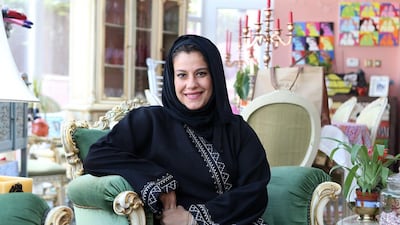Frank, blunt or straight-talking. They could all be used to describe Omaira Farooq Al Olama’s approach.
As an Emirati who trains fellow UAE nationals, she admits she is able to say it like it is.
“Once they understand that I am from the same community, I am able to look them in the eye and say: ‘do you know what? Today you are not ready to be a manager’,” says Ms Al Olama, 35, from Dubai. “But let us train you. Let us be there with you. And that is a promise we give companies as well. We are going to train them and we are going to make them as perfect at their job as you want them to be. We are going to get them to that level.”
Ms Al Olama’s company, Advance Learning Formulas Administration (Alf), aims to make the Emiratis it works with – either graduates, those with high school qualifications or those between jobs – more employable. It works exclusively with Emiratis and only employs Emiratis.
She discovered a gap in the market for her “by and for” Emirati training company in 2010. Before that she was working for various entities using her expertise in fraud and risk having studied criminology at bachelor’s and master’s levels in the United States. She now trains hundreds of Emiratis each year and has helped many companies fix issues with retention.
Focusing on soft skills like time management and cultural awareness, Alf runs a range of programmes developed in-house that are designed to get either the individual or the company to think differently.
One of the biggest challenges, she says, involves expats understanding how cultural differences affect aspects such as timekeeping.
“As an expat, timing is important; for example, your boss says work starts at 8am and ‘I want you to be there at 7.45am.’ Now the problem is making the Emirati understand that is lost in translation,” she says.
“For Emirati culture, it is not about time it is about how much quality of work they put in. It is about flexibility and understanding the people you are working with.”
She stresses the importance of timekeeping to the people she trains. But she expects workplaces to be fair in return.
“We challenge human resources a lot and say if you want this Emirati to stay with you and we are promising him we are going to train him and coach him, then you need to put into writing that after he has completed all this you will then stand by our target and give this person either a raise or a new job title, or whatever it is,” she adds.
And the companies listen because she gets results.
Emirates NBD’s attrition rate for Emirati employees fell from 50 per cent to just 10 per cent after working with Alf.
“Not only have they reduced the number of attrition of our nationals, they have developed a long and continuous relationship with them that often exceeds everyone’s expectations,” says Husam Al Sayed, head of human resources at Emirates NBD.
Developing and nurturing talent is all the more important as the Emirati jobs market is now extremely competitive, according to an Emirati executive search firm.
Hamza Zaouali, managing director of Iris Executives, a headhunting firm solely specialised in the placement of Emiratis, says at one time companies may have struggled to find Emiratis with master’s degrees but it is now common, which means nationals must know how to sell themselves.
“Being an Emirati is no longer enough to get the job, because we are no longer in a time where companies just want to hit quotas,” says Mr Zaouali. “Employers want their company to succeed. And especially after the crisis, they realised they have had a lot of the wrong hires who were not turning up to work etc, so we have seen a shift with our clients; they were much more demanding when it came to profiles and their selection process. So the interview process is a bit longer. They go through psychometrics. In fact there is not a single difference between what you would expect from a non-Emirati and an Emirati.”
That increased competition has another effect. It means that many must now accept lower positions at the outset of their career, something Ms Al Olama knows all about.
“[I tell them] when I first came here I had a master’s degree and I took a job which made me get coffee, do photocopying, what you would normally do as a 21-year-old or a 22-year-old,” she says.
“They are like, ‘how come you didn’t demand a manager’s position?’ I said: ‘if I had demanded that, today I wouldn’t be able to run my company because I would have burnt out by 25 thinking I knew everything and I would have never progressed. There is no shame in taking a low-paying job when you are a fresh graduate. Don’t expect something too big because you are not there yet.’”
business@thenational.ae
Follow The National's Business section on Twitter


